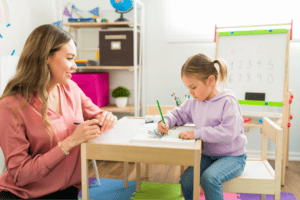(Listen to our podcast – Just Needs — Episode 8 – Navigating Special Education: a crash course)
Someone–a teacher, pediatrician or concerned friend– has just suggested that your child may need special education. You freeze. What?! Why?! What does special education even mean? In your head, you see visions of dim classrooms with listless students doing…not a whole lot. But be assured that it is not like that! (At least not anymore, and not in most places!) Special education is not a type of classroom. It’s a set of professional services and specialized teaching that focuses on the unique needs of your child.
What is special education and why is it important?
What:
Special education (nicknamed special ed or SPED) means specialized teaching and related services to help children with disabilities make progress in school. Related services are things like speech therapy, occupational therapy, or counseling. See a 1-minute video on Special Education.
Who:
To qualify for special education, a child must have a disability that affects their ability to learn in school. This could be a developmental disability like autism or sensory processing disorder, a learning disability like dyslexia or dysgraphia, or a physical disability like being blind or Deaf. Learn exactly who should qualify.
Why:
Why is special education important? The whole point is to give children with disabilities extra support so they can learn in school like everyone else. If a child’s disability prevents them from learning, the specialized instruction can use proven teaching strategies that match the disability. For example, a child who is struggling to learn to read may work with a reading interventionist one-on-one or in a small group. They will use teaching techniques that have been designed for students with reading disabilities. Focused therapies for speech, motor coordination, behavior, and social skills can help a child build some of these skills that they may be behind on–skills which are essential for learning.
Where:
This is a more complicated question than it may seem. Special ed is required by law to happen in the Least Restrictive Environment (LRE) that meets the student’s needs. This means that a child should spend as much time in the regular classroom as possible. They may be “pulled out” to work with specialists at some points during the week, or they may spend part of their day in a specialized classroom. But the goal is to have them with their non-disabled peers for as much of the day as possible. For some children, a specialized classroom may be the only way to give them enough individual attention. In that case, it would be the least restrictive environment (LRE) that meets their needs. But even a child in a specialized classroom should have lunch, recess or other activities with non-disabled peers if possible! (Read more about LRE.)
When:
Schools that use public funds are required by law to give special ed services to all children who qualify, starting at age 3 and continuing through age 21. This means they can get services before kindergarten, and they can continue past the traditional graduation age of 18 if they need the support for longer.
How? Here’s a rundown of the special education process:
-
Referral: If the parent, teacher or healthcare provider is concerned for any reason and thinks the child may have a developmental, learning or physical disability, they can ask the school district for an evaluation. The school is then legally required to do the evaluation. (Read more abut the referral.)
-
Evaluation: The school will schedule an evaluation, which includes a variety of different tests, depending on the child’s needs. The results will say whether the child qualifies, and if so, what services they may need. Parents have a legal right to disagree and ask for another evaluation. (Read more about the evaluation)
-
Set up an IEP (Individualized Education Program): This is a legal document that describes the child’s goals, and the services the school will provide to help them meet these goals. The parents or guardians are part of a team that works together to develop the IEP, and it is reviewed at least every year. (Read more on the IEP process or watch a 2-min. video about IEPs)
-
Start the services and monitor progress: Your child will get the services that are written into the IEP. Parents should keep in contact with the teacher and IEP team, make sure the services are happening, and ask for a team meeting if you are not satisfied that your child is making progress. (Asking to meet anytime is another legal right!) (Read more on keeping track of an IEP)
Know your rights and the school’s requirements
Did you notice how many legal rights we mentioned? You have rights and the school has responsibilities, which are all guaranteed by a federal law: IDEA: Individuals with Disabilities Education Act. One of the best ways you can help your child get the school services they need is to know these rights and responsibilities, and advocate for them. (Read more about knowing your rights under IDEA)
Here are a few examples:
You and your child have the right to:
-
Get an evaluation, paid for by the school if you have concerns
-
Ask for a team meeting anytime
-
Have all written and spoken information in your preferred language
-
Have meetings at a time and place that works for you
-
Get all the services listed in the IEP
The school’s responsibilities are to comply with all of the above, and stick to a required timeline!
Advocacy
Of course, once you know your rights, you still have to advocate for them. This is not easy. No one wants to be the squeaky wheel, but sometimes that’s what you’ll need to be. Here are a few tips to help you be a good advocate:
-
Start with the assumption that everyone’s goal is to help your child. Keep your child’s needs at the heart of everything.
-
Stay involved! Know what’s happening in your child’s classroom, and with their special ed services.
-
Be calm but firm. Fall back on the law if needed. That will make it less personal and emotional.
-
Keep records of all your communications with the school. Use them to keep the school accountable for what they said they would do.
-
Know the chain of command, and who to talk to about your concerns. If you have complaints and nothing is changing, learn about the dispute resolution process.
The bottom line: don’t be afraid of special ed! Understand what special education is and why it’s important. Its purpose is to help your child, and you will be involved in the process the whole way. School is hard enough without having a disability. So if your child can get support, special ed can help them to learn, fit in, and feel good about themselves.
More Resources:




